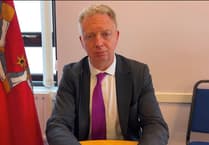The island’s gambling sector is under attack from organised crime, the head of the industry’s regulator told a Tynwald committee.
Gambling Supervision Commission (GSC) chief executive Mark Rutherford was quizzed over the challenges facing the industry as he gave evidence to the economic policy review committee.
He told the committee: ‘There have been some incredibly challenging things facing us and the sector.
‘I think that the most significant one is the emergence of a credible and sophisticated threat to the gambling sector and the police have articulated that the gambling sector has been exploited by organised crime.
‘We are under attack, and we are taking the fight back to the enemy.’
He said since November, the GSC has started to conduct a deep review of the risk profile on its estate, focusing on acute risks first.
GSC chairman Gregory Petts said the attractiveness of the Isle of Man licence historically had been diminished by the growth in other countries bringing in their own licensing regimes.
He said: ‘The attractiveness of that licence was that it was a world-facing licence, but so many countries now have brought in their own licensing regimes. So it is difficult to find that USP. The USP has been diminished.’
Mr Rutherford was asked about the surrender of licences by major operators over the past few years.
There were 18 surrenders last year and 15 the year before - but there have been 16 licences surrendered already this year.
The chief executive said licences might be given up as they are no longer commercially viable or because a company is relocating and was shifting to a country has opened its market for licensing.
High risk operators found with significant failings had in some cases surrendered their licence, thinking that would ‘get them off the hook’, Mr Rutherford said. ‘And it does not, for what it is worth,’ he added.
Kate Lord-Brennan suggested that a once light-touch GSC has become perhaps overly bureaucratic in some of the obligations it subjects licensees to - and this was making the concept of holding of an Isle of Man licence not sufficiently cost effective.
Mr Rutherford replied that this view might be the result of the enforcement actions that have been taken since mid-2024 onwards.
Committee member John Wannenburgh asked if the emerging threat from organised crime had been seen coming.
Mr Rutherford replied: ‘It is one of the questions that is yet to be answered.
‘Ultimately, I think everyone has got a fairly legitimate question which is how we found ourselves in this position. Somebody in the Isle of Man must have first seen this.
‘When did one of the agencies see this and how did that galvanise an all-island approach? As the GSC you would expect us to be able to see them, even if they had not triggered any of those other trip lines.’
He said interagency co-operation had probably not been where needed to be, but ‘now that we can see what everyone else can see, we have got a pretty good idea of what we are facing’.




